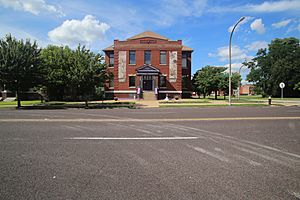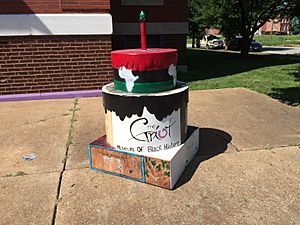The Griot Museum of Black History facts for kids

Griot Museum of Black History
|
|
| Former name | The Black World History Wax Museum |
|---|---|
| Established | February 1997 |
| Location | St. Louis, Missouri |
| Type | wax museum |
| Founder | Lois Conley |
| Public transit access | |
The Griot Museum of Black History is a special museum in St. Louis, Missouri. It opened in 1997. At first, it was called The Black World History Wax Museum. In 2009, its name changed to The Griot Museum of Black History.
In some parts of West Africa, a griot is a person who tells stories and history. They are like a living library of their community's past. The Griot Museum does something similar. It collects and shares the stories, culture, and history of Black people. It especially focuses on those who have a connection to the St. Louis area.
Contents
Museum History
The Griot Museum is the second museum of its kind in the United States. The first one is the National Great Blacks In Wax Museum in Baltimore. The Griot Museum was started by Lois Conley. She was born in St. Louis. Lois Conley studied at Saint Louis University. She also learned about how museums work at the University of Missouri–St. Louis.
In 2009, the Missouri Humanities Council worked with the Griot Museum. They also partnered with two other St. Louis museums. This group was called the Urban Museum Collaborative. They wanted to share ideas and create educational programs together. Their goal was to connect museum exhibits with the neighborhoods around them.
Museum Exhibits and Programs
Permanent Exhibits
The Griot Museum has many interesting displays. You can see wax sculptures, art, and historical items. These exhibits feature important historical figures. Some of these figures include Carter G. Woodson, Josephine Baker, Dred and Harriet Scott, and Dr. Martin Luther King Jr.. Other famous people like Miles Davis and Madame C.J. Walker are also shown. The museum's founder, Lois Conley, made many of the wax sculptures herself.
One special exhibit is a slave cabin. This cabin was built on a plantation in Jonesburg, Missouri. There is also a small model of a slave ship. This model shows how Africans were brought to America during the Atlantic slave trade. A film about this journey, called the Middle Passage, plays nearby. Another exhibit shows how people were sold at the Old Courthouse. It includes items from people who were enslaved. Other parts of the museum highlight famous people and important moments in St. Louis Black history. These include stories about music, farming, and community service.
The museum also hosts art shows and educational events. They have talks in the galleries and celebrate different cultures.
Seasonal Exhibits and Programs
The museum often has special exhibits and programs that change throughout the year.
"40 Acres and a Mule" Art Show
This is an art show and fundraiser held every year. Its name comes from a promise that was not kept. After slavery ended, formerly enslaved Black farmers were promised forty acres and a mule. This promise was meant to help them start new lives.
"Eminent Domain/Displaced" Exhibit
This exhibit told the stories of two historic St. Louis neighborhoods. These areas, Mill Creek Valley and parts of St. Louis Place, were torn down. This happened to make space for a new government building. The exhibit showed how these changes affected people's lives.
Black HIV/AIDS Awareness
In 2019, the Griot Museum held events for National Black HIV/AIDS Awareness Day. This was to help people learn about HIV/AIDS. The museum encouraged community members to share their stories and offered health screenings.
Black HerStory Initiative
In 2021, the Griot Museum received a special grant. This money helped them honor Black women who have made a difference in St. Louis. They plan to build monuments for two St. Louis natives, Pearlie Evans and Mary Meachum. These monuments will celebrate their contributions to the city's culture, society, and politics.
See also
 | George Robert Carruthers |
 | Patricia Bath |
 | Jan Ernst Matzeliger |
 | Alexander Miles |


